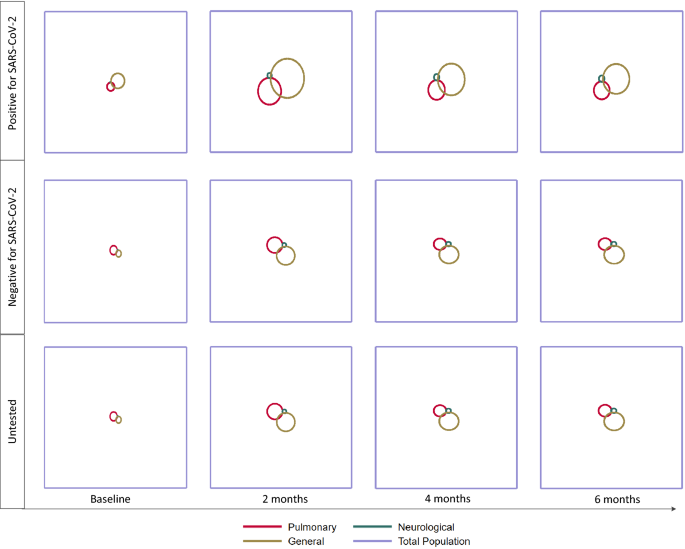Kalliope
Senior Member (Voting Rights)
Prevalence of long COVID complaints in persons with and without COVID-19
Abstract
We studied the prevalence and patterns of typical long COVID complaints in ~ 2.3 million individuals aged 18–70 years with and without confirmed COVID-19 in a Nation-wide population-based prospective cohort study in Norway.
Our main outcome measures were the period prevalence of single-occurring or different combinations of complaints based on medical records: (1) Pulmonary (dyspnea and/or cough), (2) Neurological (concentration problems, memory loss), and/or (3) General complaints (fatigue). In persons testing positive (n = 75 979), 64 (95% confidence interval: 54 to 73) and 122 (111 to 113) more persons per 10 000 persons had pulmonary complaints 5–6 months after the test compared to 10 000 persons testing negative (n = 1 167 582) or untested (n = 1 084 578), respectively.
The corresponding difference in prevalence of general complaints (fatigue) was 181 (168 to 195) and 224 (211 to 238) per 10 000, and of neurological complaints 5 (2 to 8) and 9 (6–13) per 10 000. Overlap between complaints was rare. Long COVID complaints were only slightly more prevalent in persons with than without confirmed COVID-19.
Still, long COVID may pose a substantial burden to healthcare systems in the future given the lasting high incidence of symptomatic COVID-19 in both vaccinated and unvaccinated individuals.
https://www.nature.com/articles/s41598-023-32636-y
Abstract
We studied the prevalence and patterns of typical long COVID complaints in ~ 2.3 million individuals aged 18–70 years with and without confirmed COVID-19 in a Nation-wide population-based prospective cohort study in Norway.
Our main outcome measures were the period prevalence of single-occurring or different combinations of complaints based on medical records: (1) Pulmonary (dyspnea and/or cough), (2) Neurological (concentration problems, memory loss), and/or (3) General complaints (fatigue). In persons testing positive (n = 75 979), 64 (95% confidence interval: 54 to 73) and 122 (111 to 113) more persons per 10 000 persons had pulmonary complaints 5–6 months after the test compared to 10 000 persons testing negative (n = 1 167 582) or untested (n = 1 084 578), respectively.
The corresponding difference in prevalence of general complaints (fatigue) was 181 (168 to 195) and 224 (211 to 238) per 10 000, and of neurological complaints 5 (2 to 8) and 9 (6–13) per 10 000. Overlap between complaints was rare. Long COVID complaints were only slightly more prevalent in persons with than without confirmed COVID-19.
Still, long COVID may pose a substantial burden to healthcare systems in the future given the lasting high incidence of symptomatic COVID-19 in both vaccinated and unvaccinated individuals.
https://www.nature.com/articles/s41598-023-32636-y


